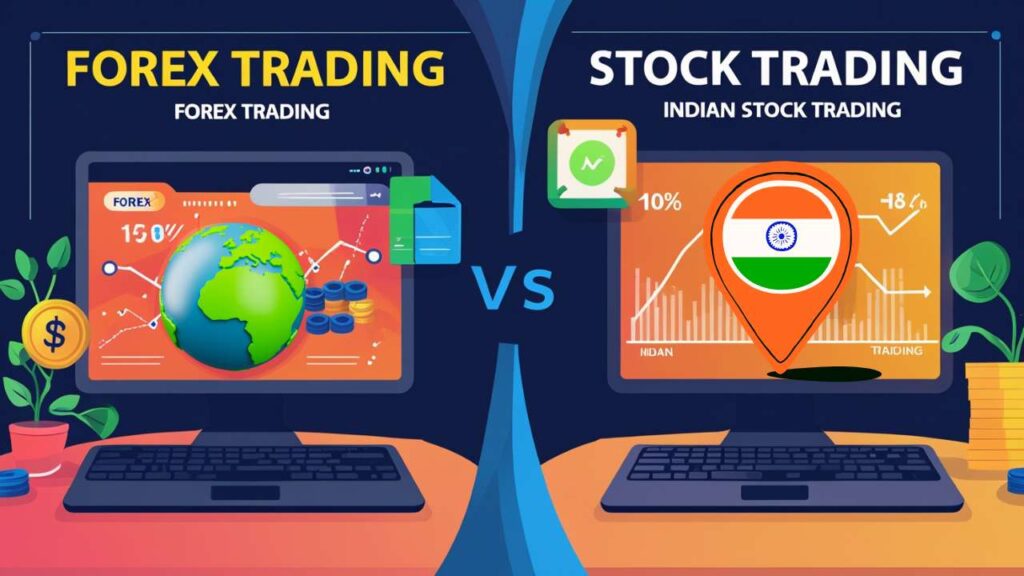Forex Trading vs. Stock Trading: Which is More Profitable in 2025?

Introduction When it comes to investing, traders often compare Forex Trading vs. Stock Trading to determine which market offers better returns. Both markets provide opportunities for financial growth, but they differ in size, risk, volatility, and profitability. Whether you are an experienced trader or a beginner, understanding the key differences between Forex and stock markets can help you make informed decisions. This article will provide a detailed comparison of Forex Trading vs. Stock Trading, covering aspects like market size, risk factors, investment potential, and the best choice for Indian investors. Understanding the Basics What is Forex Trading? Forex (foreign exchange) trading involves buying and selling currency pairs to make a profit. It operates 24/5, making it one of the most liquid and active markets in the world. What is Stock Trading? Stock trading involves buying and selling shares of publicly listed companies. Investors make profits through price appreciation and dividends. Stock markets operate on specific exchanges like the NYSE, NASDAQ, and BSE during fixed hours. Market Size Comparison Forex Market vs. Stock Market Size The Forex market is significantly larger than the stock market. The daily trading volume of Forex is around $7.5 trillion, whereas the global stock market trades about $200 billion per day. Market Daily Trading Volume Forex Market $7.5 trillion Stock Market $200 billion This massive liquidity in Forex makes it easier for traders to enter and exit trades quickly. Key Differences Between Forex and Stock Trading Trading Hours and Market Accessibility Liquidity and Volatility Leverage and Margin Trading Profit Potential How Profitability Differs in Forex vs. Stock Trading Short-Term vs. Long-Term Trading Profits Risk Factors in Forex and Stock Trading Volatility and Market Stability Risks of Forex Trading vs. Risks of Stock Trading Forex Trading vs. Indian Stock Market: Which is Better? For Indian traders, stock trading in NSE/BSE offers more regulation and lower risk, while Forex trading provides high returns but requires careful risk management. Best Choice for Indian Investors Investment Capital Requirements Regulation and Security Ease of Entry for Beginners Taxation and Costs Factor Forex Trading Stock Trading Transaction Costs Low spreads, no commissions in many cases Brokerage fees, commissions Taxes Capital gains tax varies Dividends are taxable Hidden Costs Swap/rollover fees Management fees in some stocks Long-Term Wealth Building Pros and Cons of Each Market Advantages of Forex Trading ✅ 24/5 trading hours✅ High liquidity✅ Low trading costs Disadvantages of Forex Trading ❌ High risk due to leverage❌ Requires deep knowledge of global markets Advantages of Stock Trading ✅ Safer for long-term investments✅ Dividend income potential✅ More regulated environment Disadvantages of Stock Trading ❌ Limited trading hours❌ Requires higher initial capital Conclusion: Which One Should You Choose? Choosing between Forex Trading vs. Stock Trading depends on your risk tolerance, investment goals, and market knowledge. Ultimately, a diversified approach that includes both markets can provide the best financial growth. Frequently Asked Questions (FAQs) 1. Is Forex trading riskier than stock trading? Yes, due to high leverage and volatility, Forex trading is riskier than stock trading. 2. Can I trade Forex and stocks simultaneously? Yes, many traders diversify by trading both markets. 3. Which is better for beginners, Forex or stock trading? Stock trading is easier for beginners due to lower leverage and risk. 4. How much money do I need to start trading? 5. Are Forex trading profits taxable? Yes, Forex trading profits are subject to capital gains tax. 6. Which market is more profitable in the long run? Stock trading is generally better for long-term wealth building. FOR MORE CLICK HERE
